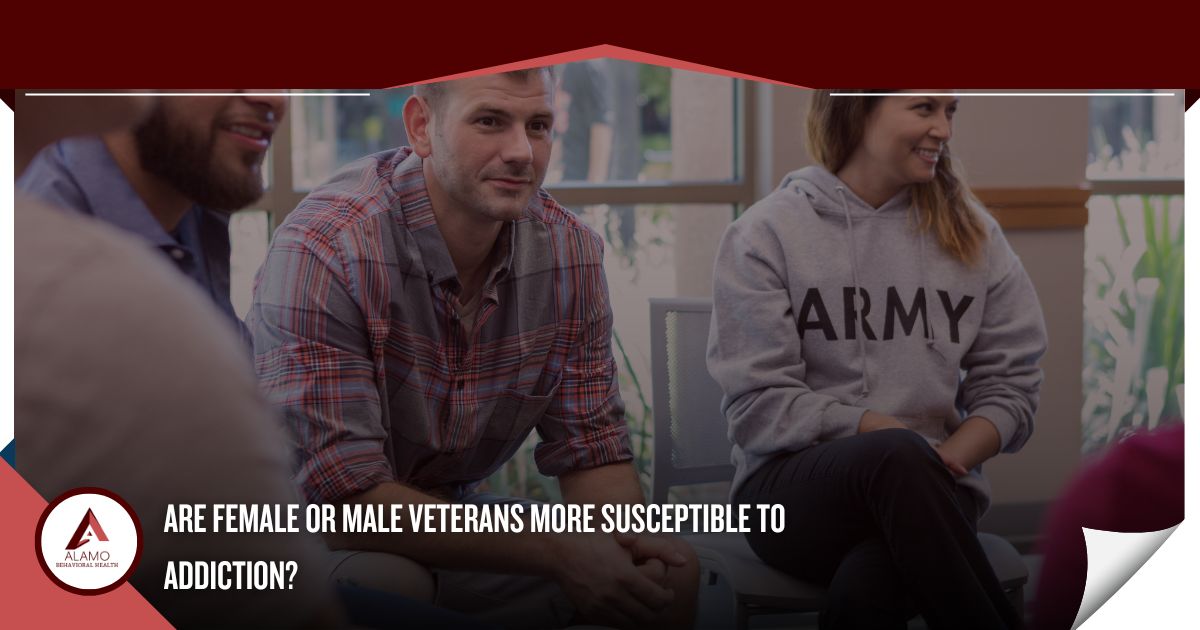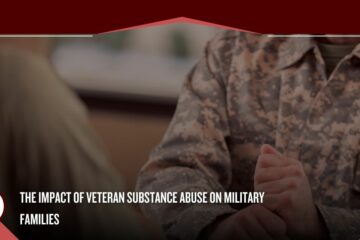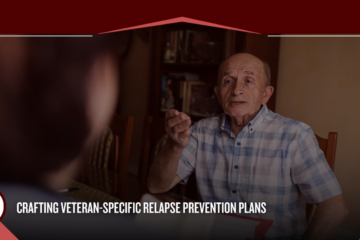 Addiction is a chronic and progressive disease that causes a person to be unable to control their substance use even when they are facing direct consequences, such as physical health problems, mental health symptoms, or social isolation. According to the U.S. Department of Health and Human Services (HHS), 46.3 million people suffered from a substance use disorder in 2021.[1]
Addiction is a chronic and progressive disease that causes a person to be unable to control their substance use even when they are facing direct consequences, such as physical health problems, mental health symptoms, or social isolation. According to the U.S. Department of Health and Human Services (HHS), 46.3 million people suffered from a substance use disorder in 2021.[1]
While addiction is increasingly common among the general population, it also affects veterans at staggering rates. The National Institute on Drug Abuse reports that addiction affects 1 in 10 veterans, which is slightly higher than the rate of substance use disorders among the general population.[2] This may be due to several factors, including the rates at which veterans are exposed to traumatic events.
Both male and female veterans are susceptible to addiction, but they may have different drivers behind their substance abuse. Some studies report men experiencing higher rates of substance abuse while others report similar rates across both sexes. Overall, it seems like male and female veterans experience addiction at the same rate.
What Factors Increase the Risk of Addiction Among Veterans?
While everyone can experience trauma, people in the military are more likely to be exposed to traumatic events simply due to the places their jobs take them. This is especially true if you are a veteran who has experienced combat. Being exposed to these traumatic situations can increase one’s likelihood of developing addiction, especially if they do not seek professional help for their trauma.
Some of the factors that increase the risk of addiction among veterans include:[3]
- Deployment
- Combat exposure
- Post-deployment or reintegration challenges
- Developing post-traumatic stress disorder (PTSD)
- Experiencing traumatic training situations during boot camp
- Being in an environment where drinking alcohol is prevalent
It is important to note that not every veteran will develop an addiction. Even if you experience trauma during your time in the military, you can seek help from a mental health provider who can help you healthily process your trauma. However, individuals who do not seek professional support are more likely to begin abusing substances to cope with their painful memories and emotions.
Additionally, the factors that contribute to the development of addiction might be different when comparing female and male veterans. Oftentimes, female veterans have a combination of trauma from their early childhood and traumatic events they experienced during their time in the military. It is less common for male veterans to have early childhood trauma, making most of their risk factors for addiction stem from their time in the military.
Is Addiction More Common Among Male or Female Veterans?
Among the general population, men are more likely to abuse almost all types of illicit drugs than women are.[4] With that being said, this pattern is common among veterans as well, as male veterans are more likely to suffer from addiction than female veterans.
Research shows that 10.5% of male veterans abuse alcohol, and 4.8% abuse illicit drugs. On the other hand, 4.8% of female veterans abuse alcohol while 2.4% are current illicit drug users.[3]
This means that this study found that male veterans are almost double as likely to suffer from alcoholism or drug addiction when compared to their female counterparts.
However, another study found that the rates of substance use disorders are the same across male and female veterans.[5] The reason other studies have found male veterans suffer from addiction at higher rates is simply because there are more men in the military than women.
Signs You Need Treatment for Addiction
Whether you are a male or female veteran, you should never struggle with addiction alone. Drug addiction and alcoholism can be incredibly difficult to overcome, making it vital that you seek support from a professional rehab program.
It is common for people struggling with an addiction to have a hard time identifying signs that they require treatment. As a result, it is important to be aware of the symptoms of addiction and when it is time to seek professional help.
The signs you need addiction treatment include:
- Using substances in higher doses or for longer than you intended to
- Wanting to quit but being unsuccessful
- Continuing to use substances despite facing problems at home, school, or work
- Experiencing the social consequences of addiction, such as getting into fights with loved ones
- Continuing to use drugs or alcohol despite facing adverse mental and physical health effects
- Needing to increase the dose of a substance to experience the desired effect
- Experiencing cravings or uncontrollable urges to misuse a substance
- Dealing with withdrawal symptoms when you cannot consume alcohol or drugs
Get Connected to a Veteran’s Addiction Treatment Program
If you or a loved one are a veteran who struggles with addiction, you must receive treatment that addresses the intricacies of military trauma. At Alamo Behavioral Health, we use trauma-informed treatment methods to ensure that our veterans recover from the experiences that caused them to develop an addiction in the first place.
To learn more about our addiction treatment program for veterans, contact us today.
References:
- The U.S. Department of Health and Human Services (HHS): SAMHSA Announces National Survey on Drug Use and Health (NSDUH) Results Detailing Mental Illness and Substance Use Levels in 2021, Retrieved December 2023 From https://www.hhs.gov/about/news/2023/01/04/samhsa-announces-national-survey-drug-use-health-results-detailing-mental-illness-substance-use-levels-2021.html
- The National Institute on Drug Abuse (NIDA): Substance Use and Military Life DrugFacts, Retrieved December 2023 From https://nida.nih.gov/publications/drugfacts/substance-use-military-life
- The National Library of Medicine (NLM): Substance use disorders in military veterans: prevalence and treatment challenges, Retrieved December 2023 From https://www.ncbi.nlm.nih.gov/pmc/articles/PMC5587184/
- The National Institute on Drug Abuse (NIDA): Sex and Gender Differences in Substance Use, Retrieved December 2023 From https://nida.nih.gov/publications/research-reports/substance-use-in-women/sex-gender-differences-in-substance-use
- U.S. Medicine: Among Veterans, Women as Likely as Men to Have Substance Abuse, Retrieved December 2023 From https://www.usmedicine.com/clinical-topics/mental-health/among-veterans-women-as-likely-as-men-to-have-substance-abuse/






